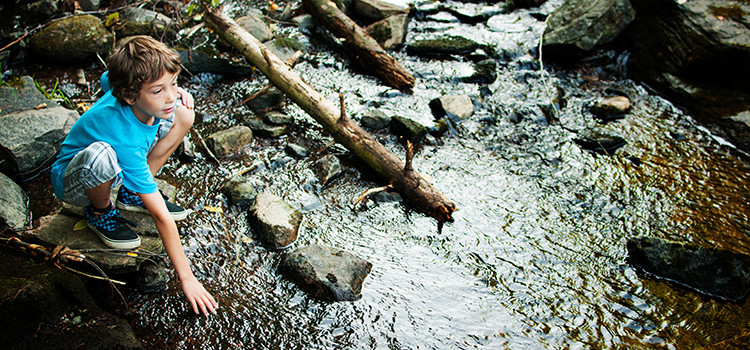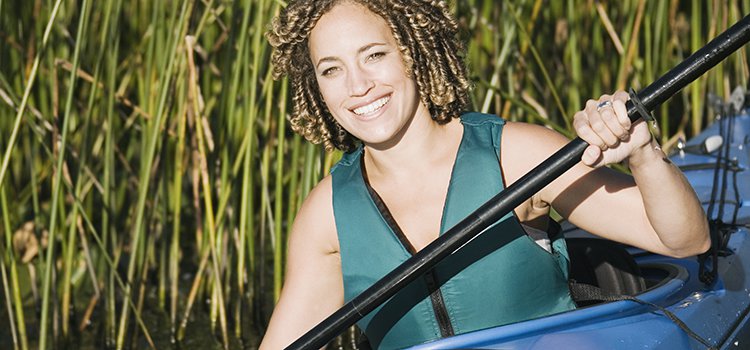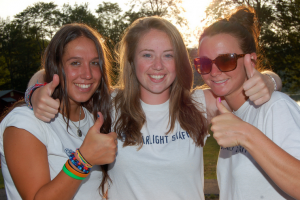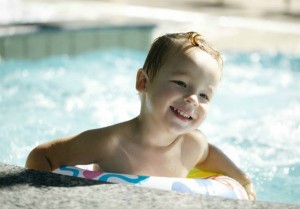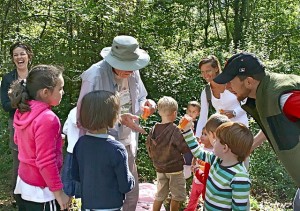Considering exploring overnight camps for your children this summer? Two directors share tips to prepare kids for the positive experience of a lifetime.
By Laura Quaglio
If your kids haven’t tried sleepaway camp, you’re entering uncharted territory for your family. That, however, is not actually a bad thing. “Doing something outside of your comfort zone burns memories that last forever because it won’t blend into the background of life,” says Michael Richards, founder and executive director of Science Camps of America based in Pahala, Hawaii. When kids spread their wings, they can grow as a person — and become more the person they really are, not limited by the perceptions and history of their classmates or even their own family.
“Campers all enter on this totally equal basis, and they can express their personality without the backdrop of their whole life, their whole history,” says Richards, whose camps are for teens aged 13 to 17 who are interested in exploring volcanoes, rocks, forests, oceans, and skies of Hawaii to learn about related sciences like geology, climate, and astronomy. “You can’t come to school and reinvent yourself — or even be yourself,” he adds. “In the camp, kids can express their personality and no one is going to judge them or say, ‘Why did you suddenly change?’ I think that gives kids tremendous empowerment.”
Shop for overnight camps > >
Being in a camp environment also helps prepare kids to function as positive and productive members of society during adulthood. At Camp Chrysalis, where kids aged 8 to 17 explore various outdoor environments in California, director Lee Tempkin takes pride in showing campers how “shared leadership” works. “Everyone calls me Lee, though it’s clear I’m the leader,” he says of his management style. “The staff and I have camp huddles, talk around the campfire, and discuss who would like to give the next camp talk,” he says. “Kids see that we are all part of an adult community. That we respect and work with each other and with them.” Being in a tight-knit group 24/7, even for a short time, helps kids build stronger teamwork skills and independence, all of which will serve them well when they eventually leave home as a young adult entering the workforce or college.
Still a bit hesitant? Worried if your kid will thrive and if you will survive? Here are some ways to tell whether you and your child are ready … and how to prepare them for a transformative, positive experience.
Think About Their Personality
Richards says that “the vast majority of kids love [overnight camp], even if it is their first time doing it.” The kids who do best, says Tempkin, are those who are open, flexible, and positive about new experiences. His camps expose kids to a variety of outdoor activities while living among redwoods, tide pools, marshes, and mountains and learning about ecology and our responsibility for our planet. Kids will get dirty and wet. They’ll sleep in tents with other campers and learn outdoor skills. Kids who are accustomed to spending most of their time in an urban area, indoors, or in solo activities may have a tougher time adapting. For them, as well as kids younger than age 8, he says it’s better to start with overnights or a weekend getaway at a friend or family member’s house. “Summer camp is not the time to have a kid be away from mom and dad for the first time,” he says.
Kindness, too, is key. “Kids who are mean to other kids may have a hard time,” says Tempkin. Campers will be interacting with each other in close proximity all day (and night) without breaks. Kids don’t have to like everything or everyone new, he notes, but they need to appreciate different experiences and different kinds of people.
In a way, this is good news, because it means that bullying is not generally a problem at either of these overnight camps, and probably many others. “Kids are amazingly open about it, and they won’t let anyone get away with the slightest bit of it,” Richards says. “Maybe because they’re not with their usual peer group. They think, ‘Let’s stop this before it starts.’ It’s really something to see.”
Let Your Child Choose the Camp
Richards says that telling a kid, “you’re going here” is one of the biggest mistakes parents make. Of course you won’t want to let your child have the only say-so: Sometimes kids don’t have the same concerns that you do. And if you aren’t comfortable with their pick, your child will sense that, and it might affect their stay. On the other hand, kids will be more invested in having a good time if they are allowed to select a program that excites them.
Some camps offer a range of activities that can include athletics, crafts, survival skills, and so on. Others center on a particular theme, such as a single sport, academic subject, or interest (like soccer, science, or computer coding). “Kids find us because they’re interested in science,” says Richards. “So they’re going to be in a group of like-minded kids. All of a sudden, these kids have that shared enthusiasm, and that makes it a very good social experience.” On the other hand, kids who don’t have a specific interest may prefer to dabble in a variety of activities, which can help them find a new hobby they’ll love. Either way, discuss these different options and be sure your child knows what “their” camp offers.
Encourage Their Independence
At Camp Chrysalis, kids learn to keep track of their gear, their toothbrush, their fork, and so on. They will spend 8 to 12 days at Big Sur, Mendocino, or Sierra. They will hike, swim, and hang out. They also learn camping skills like “how not to damage a tent,” “how to sterilize drinking water,” and “how to whittle safely.” You can help set them up for success by encouraging them to take more responsibility for such items and actions at home. Let them start packing their sports bag or packing their lunch for school. When preparing for camp, have them help you pack their labeled camp gear, too, so they know where everything is located.
At Science Camps of America, Richards likes to give kids as much choice as possible throughout the day, such as which bed to sleep in, which van to ride in, and what topic to debate that evening. If you don’t already do so, start encouraging your kids to make more of their own choices when it’s feasible.
Another tip: Once they’re at camp, leave them be. Both camp directors agree that kids will have a better experience if their parents aren’t checking in all the time. In fact, many camps take away tech, though they’ll certainly allow phone calls if a child is particularly homesick.
If you miss texting your kids, remember this: Taking that away will free them up to interact with the kids at camp. Richards says he gathers up the cell phones after each camp’s orientation. “The kids know that it’s going to happen and they’re all horrified by the prospect of it, but within a few hours, you’ve got 20 strangers who are best friends. It’s amazing to see how fast they socialize and connect without cell phones to distract them.” You can both get accustomed to the idea by easing up on the tech connections at home a bit, too. And if they do phone home, Richards says make sure to tell them you’re excited and happy for them. You may feel like you should tell them how much you miss them, but both camp directors agree that this often makes kids feel guilty about having fun, which can inhibit their ability to immerse themselves in the experience.
Shop for overnight camps > >
Do a Bit of Detective Work
Fear of the unknown can be powerful, but it’s easy enough to dispel some of it. Richards, for one, believes in finding information that helps kids and parents “envision the environment” and understand what a typical day or week will hold.
“I encourage parents to look at the camp’s website with their kids,” says Tempkin. “We also have a family night in June, where we show slides. I think it’s reassuring to have some of the basic information so it’s not so scary for them to go off on their own.”
If you like, call the camp and see if a director or staff member can answer your questions. What do the facilities look like? What food will be provided? What will the campers learn? Work with your kids to create a list of things you want to ask.
If you learn something you think the kids won’t love, don’t withhold the information from them, advises Tempkin. “I’m a believer that kids are people who need to be respected to handle information, especially regarding an experience that is going to be their experience.” The more a child knows, the better they can picture themselves there, having a great time.
Talking to other parents can be helpful, too. Ask the camp director for references. Also look for written reviews such as the ones on ActivityHero or on the camp’s website.
Ask About Staff Numbers, Age, and Experience
For parents who are worried about their kid getting lost in the shuffle, it’s important to look at the size of the camp, says Tempkin. “We divide our campers into four small groups of 8 or 9 kids with 2 staff members, and they eat together and doactivities together on a daily basis, so the staff gets to know the campers really, really well.” Richards, too, has a smaller camp, with just 20 kids and 5 staff members per session. “We try to develop a relationship with each kid, one-on-one,” he says. “Our motto is: Don’t treat them as a group. Treat them as individuals.”
Maturity of the staff is important too, says Tempkin. Half of his staff members are adults, not college or high school students. “The maturity of the staff is reassuring for families who have never done camp before,” he says. Younger staffers can serve as great role models or mentors, but there must be enough adults available to deal with larger concerns and keep campers on track.
It’s also a good sign if some staffers are former campers, since they will know the culture, and they obviously enjoyed their stay when they were kids. Tempkin says that most of his staff grew up attending his camp, and he has known them since they were 8 or 10 years old. “They act as mature mentors who can be a positive factor in the kid’s life,” he says. “Kids need adults in their lives who are not their parents, especially as they become teens. A good camp can provide those mentors.”
Last, ask how long staffers have been with the camp. A low turnover rate means staffers know what they’re doing — and they enjoy it enough to return summer after summer.
Talk About How Kids Can Share Their Experiences With You
Kids love to teach their parents, and attending a summer camp offers them a chance to learn new things and then pass them on. Your child can do this by keeping a journal. Kids at Camp Chrysalis write in a “Bear Book.” In fact, Tempkin says that this can also help dispel some homesickness because kids know they can always write a letter to home and share it later. They also send a postcard to parents midway through the trip. This is fun for kids, most of whom have never written out a postcard before, and for parents who feel better when they receive even a brief communication.
Another option might be to revisit the locations your child explored and ask them to serve as your tour guide. Richards says that one mom and her son spent a few days in Hawaii after his camp ended, and she phoned a few days later to share how much her son enjoyed showing her around the island. Richards adds, “It gave that boy an opportunity to take what he had learned and teach it to his mother. And as we know, when we teach something, that’s when we really learn it.” Tempkin has similar stories of campers who became “great tour guides of the areas they’ve learned about.”
As for parents, knowing that our children have surpassed us, even in a small area of expertise, is tremendously rewarding. So when they share, listen closely and ask questions.
In the meantime, go ahead and start making your own list of what you want to do — or where you’d like to go — when your kids are at sleepaway camp. Who knows? Their getaway might be a transformative experience for you, too.



